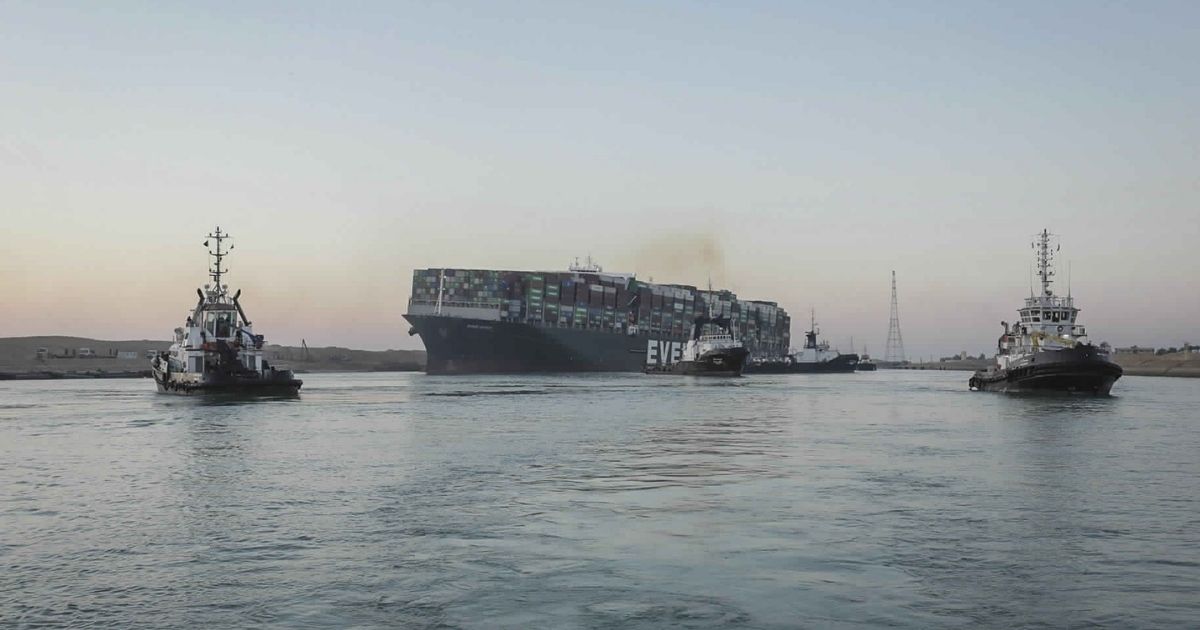
Young Not Stupid: A Suez Blockage Shouldn't Hurt Americans But Thanks to the Global Economy It Will
The Ever Given cargo ship was finally freed early Monday morning, after six days of being stuck in the Suez Canal in Egypt.
Many trade experts and social media users alike were asking themselves about the consequences of the ship being stuck, and the best way to get it out. Some comical suggestions included using WD-40, or my personal favorite — a stick of butter.
WD-40 can fix it.#suezcanel https://t.co/UxjhJNslKH
— Greg Abbott (@GregAbbott_TX) March 28, 2021
But ultimately, the 220,000-ton container ship was able to continue its journey thanks to salvaging crews coordinating with the timing of the tides, The New York Times reported.
Except the incident should not be dismissed now that it’s over, because its impact raises serious questions about the negative side effects of globalism.
Suez Canal Authority (SCA) announced Ever Given ship changed its course with 80% after it was partially freed. #Egypt #Suez #SuezCanal #EVERGIVEN #Evergreen #BreakingNews|#قناة_السويس #السفينة_الجائحة #عاجلpic.twitter.com/HxFAW2LUzw
— Egypt Today Magazine (@EgyptTodayMag) March 29, 2021
The canal, which is used as an important passage for oil and gas transportation from the Middle East, is responsible for 12 percent of all global trade and 10 percent of the world’s crude oil supply, according to CNBC.
So naturally, the Ever Given blockage cost an estimated $400 million an hour, CNBC reported, and presumably created shipping delays that had a global impact.
There was additional concern from experts about the aforementioned oil and gas, as supply was already low due to production cut from the Organization of the Petroleum Exporting Countries paired with increased demand, according to The Times.
“A lot of that [oil] production has not come back yet. So now with demand starting to rise a little bit, we’re in a situation where demand is starting to outstrip supply,” OPIS Chief Oil Analyst Denton Cinquegrana said, WLS-TV reported.
In the United States, gas prices are already on track to hit three dollars a gallon nationally, with the current average price at $2.86, according to AAA.
If the blockage continued, Americans would have been almost guaranteed to pay more at the pump.
While the United States government does not have much control over the process of how retail products are made and distributed, this situation serves as a teachable moment on the energy front.
The Biden administration recently halted federal oil and gas leases, which will only increase the United States’ dependence on other countries for fuel.
While it is understandable that the United States may want to transition to forms of renewable energy, consumers still primarily use gas for everything from cars to ovens.
Oil and gas is an essential part of how the United States functions and a blockage about 6,678 miles away should not end up being a financial burden on Americans.
Global trade certainly has its benefits, but the most powerful country in the world should be mostly self-sufficient when it comes to something as significant as energy.
Truth and Accuracy
We are committed to truth and accuracy in all of our journalism. Read our editorial standards.
Advertise with The Western Journal and reach millions of highly engaged readers, while supporting our work. Advertise Today.












